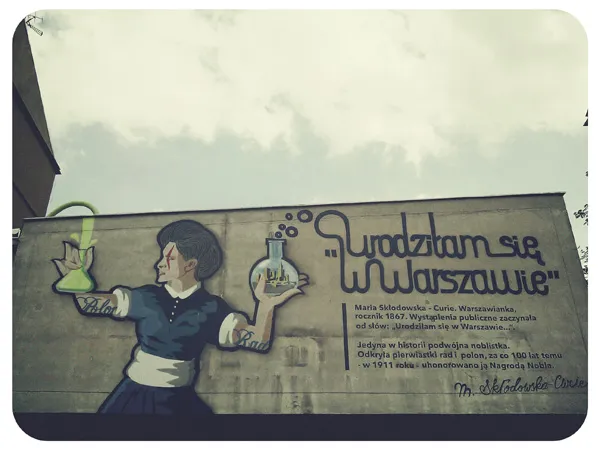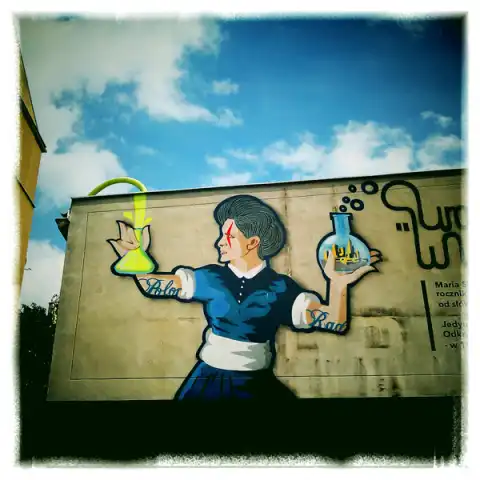At the website of the Ministry of Science and Higher Education we find an announcement of the establishing 2011 The Year of Maria Skłodowska-Curie. We further read, “On the centenary of awarding Maria Skłodowska-Curie the Nobel Prize in Chemistry for the discovery of new elements polon and rad, the Sejm of the Republic of Poland decided to pay homage to one of the most remarkable scientists of our times, whose breakthrough discoveries have contributed to the global development of science.” Presenting Skłodowska-Curie as “one of the most remarkable scientists of our times” may be interpreted in two different ways: with good will, it is an emphasis on her uniqueness among both men and women who took up science; with a bit of feminist touch – an ignorance of the fact that she was a woman, a female scientist and researcher, which had a determining influence on her carrier in Poland. After dealing with Chopin in every possible way, who nota bene just as Skłodowska-Curie spent the most creative period of his life in France, it’s worth observing what happens next with the figure of chemist during the celebration of Her name. The choice of Skłodowska-Curie seems natural and accurate: she was born in Poland, where she completed the initial key stages of education and in her youth she looked up to people symbolising positivist values of organic and grassroots work. However, as noticed by the journalist of Dziennik Wschodni in the interview with the Rector of the Maria Curie-Skłodowska University in Lublin, she had one problem: she was a woman. But did she have a problem or her contemporaries? At the turn of the 20th century women were not admitted to the universities in this part of Europe, so Skłodowska first attended illegal classes of the Flying University and then thanks to the support of her older sister she studied at Sorbonne. In hagiographies of Skłodowska-Curie, which have started to multiply since she was announced the patron (but not the ‘matroness’ of course) of this year, we read about her great devotion to Poland. Not only her acquaintance with Ignacy Paderewskim and trips to the country are to prove this, but also using Polish surname. I would rather say it was a sign of her emancipation. Taking the husband's surname is a patriarchal tradition, according to which the status of a woman is defined by the man taking care of her; first it’s a father and later a husband. A woman aware of being an object does not change her identity at the moment of getting married – why would she do that when it works only in one direction? However, the law takes a dim view of such excesses of female independence. French legislation at that time required using the husband’s surname so Skłodowska-Curie tried as much as possible to use both surnames. Yet, this interpretation cannot exists as a part of her patroness image – feminism in Poland is at variance with patriotism and not once it has been proved that it is harmful for the national interest if women emancipate. A true Polish patriot never disgraces herself by being independent from her husband and entering a partner relationship. Patriarchalism upholds the Polish national identity and keeps a firm grip on it.
It is well-known that Skłodowska-Curie’s visits in Poland pertained to both professional and private issues. She enjoyed staying in Tatry, which is an expression of the purest Polish patriotism since the invention of the Pope’s favourite kremówki. But less is written about the fact that after graduating from Sorbonne, she came back to Poland with a diploma hoping to get a position at the university and carry out her research. Although she completed the Bachelor’s Degree in Physics in Paris with the best result, it was not enough for the Jagiellonian University, which turned down the application of a woman for the position of a teaching assistant. This way, it was the Sorbonne that gained the first female professor and the Nobel Prize winner. Professor Andrzej Dąbrowski, a chemist and the Rector of the Maria Curie-Skłodowska University, stresses in the already mentioned interview, “women active on such a large scale in scientific field at the turn of the 20th century were a rarity. In fact, it happens that there are still more men in the exact science.” And so it happens and it doesn’t seem that the figure of Skłodowska-Curie has triggered any reflections among the scientific circles and politicians – who decided to make her a patroness of the year 2011 - on why so few women specializes in chemistry, physics or mathematics. It is not taken into consideration that the long-time denied access to universities results in the short tradition of scientific engagement and fewer figures to follow, and from the earliest years of education girls are encouraged to write essays, to which they are supposedly biologically conditioned, instead of doing ambitious mathematics exercises. Embarrassing cases when the of girls who major in masculinised disciplines are seen as husband-hunters do not seem to bother the rector.
Skłodowska-Curie belongs to the group of token women; meaning the women, who thanks to their exceptional determination and favourable conditions managed to overcome social barriers and achieved a success in the field dominated by men. Each group holding the power has such people in their sleeve to show that they don’t discriminate and the worse position is only the result of individual predispositions. To prove that women are not excluded from any area of life, we are taught about Queen Bona Sforza, Eliza Orzeszkowa, Emilia Plater and Skłodowska-Curie. The problem is that it’s so easy to name those great Polish women – they can be counted on fingers. Is it possible to regain Skłodowska for the tradition of female independence and treat her experience as a motivation to social changes and not only to burst with badly defined national pride?
Katarzyna Czerwonogóra
Tłumaczenie: Iwona Białek











